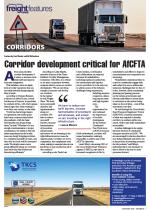There is a fresh scramble for Africa, with European countries at risk of being outf lanked in their relationships with traditional African trading partners, according to Michaël Tanchum, a senior fellow at the Austrian Institute for European and Security Policy (AIES).He warns in a paper published by the Istituto Affari Internazionali that the European Union stands at a “critical junction in the international scramble to establish Europe–Africa commercial corridors. “The pandemic has intensified the urgency for the EU to focus on trans-Mediterranean connectivity. By 2025, Africa will have over a hundred cities with more than one million inhabitants.“The African Continental Free Trade Area, launched on January 1, 2021, is expected to spur international firms to locate even more of their operations in Africa, given its large supply of affordable land and labour, along with its expanding, yet underserved, consumer market.“The post-pandemic global impetus to shorten supply chains has further accelerated this trend, as well as the timeframe for investments by international actors.”European countries may lose their traditional preferred trading status. “Undeterred by the pandemic’s severe economic impact, China, Russia, Turkey and the Arab Gulf states have expanded their economic involvement in North Africa to reshape the commercial configuration and geopolitics of the trans-Mediterranean connectivity,” he says.Tanchum identifies Morocco, Algeria and Egypt as “geopolitical gatekeepers” in the competition for three emerging corridors: Morocco’s We st A f r ic a–We st er n Eu rope corridor, an Algeria-anchored Central Maghreb corridor, and an Egypt-based East Africa-Eastern/Central Europe corridor.“The recent history of all three corridors shows that if the European Union fails to effectively plan ahead and lay the groundwork for industrial base development and value chain integration in partnership with North African nations, this will leave individual EU member states that play leading roles in trans-Mediterranean connectivity little option other than to partner with actors outside the EU system.“In the absence of coordinated EU action, the emerging architecture of trans-Mediterranean connectivity is entrenching dangerous divides among the six Mediterranean EU member states as well as exacerbating geopolitical fault lines across North Africa itself,” he warns.For South Africa, the risk is that European countries will seek to shorten supply chains by investing in North Africa to expand trade with countries that have shorter logistics chains.

